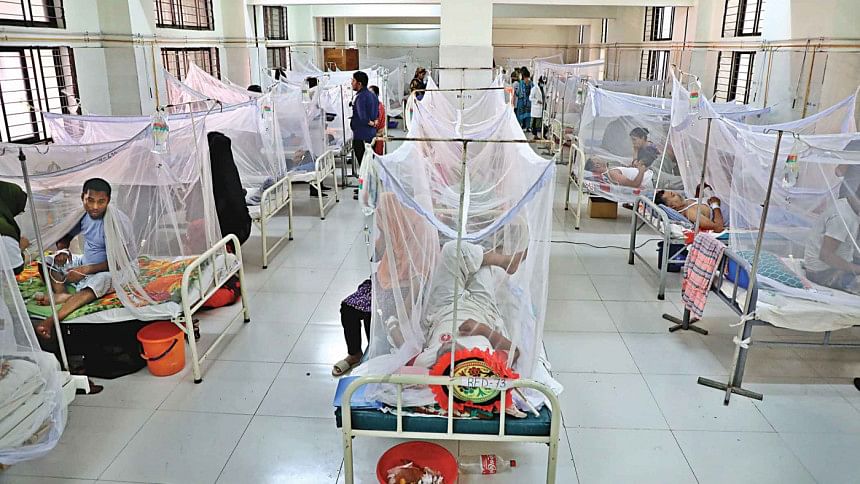182 and counting

At least five dengue patients died while 820 others were admitted to different hospitals across the country in 24 hours until yesterday morning.
With the five new deaths, the total number of dengue deaths this year rose to 182, which is the highest in a year.
A total of 101,354 dengue cases, the annual highest, were recorded in 2019 when the death toll was 179.
In 2000, during dengue's first official outbreak, 93 dengue patients died while 5,551 others were infected, according to the Directorate General of Health Services.
Multiple exposures to dengue, late admission in hospitals and late diagnosis of the disease are the main reasons for increasing dengue deaths, said experts.
A recent analysis of the patient data by the DGHS has revealed that the dengue infection rate is the highest among people aged over 20 while the death rate is high among patients aged between 40 and 80 years.
It also showed that most dengue patients who died at hospitals breathed their last within three days of being admitted to hospitals.
There are four distinct serotypes of the dengue virus: DENV-1, DENV-2, DENV-3 and DENV-4.
For the first time, researchers this year detected the presence of DENV-4 which is an indication that DENV-1, DENV-3 and DENV-4 are now active in Bangladesh, said Tahmina Shirin, director of the Institute of Epidemiology, Disease Control and Research.
Entomologists said multiple serotypes not only caused the rise in dengue cases but also turned the patients' conditions severe.
Mohammad Robed Amin, line director at the Non-Communicable Disease Control Division (NCDC) of the DGHS, said it is important to watch for other symptoms rather than worrying about platelets to reduce the risk of death from dengue.
These symptoms are: the patient's blood pressure drops, lethargy, sweating and nausea.
According to him, if these symptoms appear, the physical condition of the patient may become serious.
Robed, talking to the journalists after a programme at Bangladesh University of Health Sciences, also suggested that if these symptoms appear, it is necessary to immediately admit the patient to a hospital and give fluid or saline.
He warned that if the right amount of fluid is not given at the right time, there is a risk of death for the patient.
Asked about the increasing number of deaths from dengue in hospitals, Robed said the number of deaths in government hospitals is not high. Dengue deaths are increasing in private hospitals.
He hoped that if private hospitals follow the guidelines of the World Health Organization in the treatment of dengue, the number of deaths will decrease.
To avoid death, IEDCR Director Tahmina Shirin, suggested taking sufficient fluids in any form like oral saline, fruit juice and coconut water.
"A patient will take fluids during fever and also continue it even after the fever goes away as there will be the chance of deterioration after fever ends," she added.
The patients need to be hospitalised when they feel like vomiting, pain in the stomach, breathing issues or bleed from any part of the body, she advised.
HM Nazmul Ahsan, associate prof at Shaheed Suhrawardy Medical College, said the risk of fatalities increases if an individual previously infected with one serotype gets infected with another serotype.
He said the patients who are coming to the facility have mostly faced multiple exposures. It means they were infected by another variant of dengue earlier.
"Early detection of the infection and immediate hospitalisation can significantly lower the risk. Late admission is another reason for the rising number of deaths this year," Nazmul said.
"Many hospitals or clinics, especially private ones, do not follow guidelines on fluid management, he said, adding that this is one of the reasons for the increasing number of deaths, he said.
Prof MA Faiz, former director general of DGHS, recently told The Daily Star that a lack of proper information about the actual number of dengue patients and laboratory diagnosis data is a "big weakness" for the country's health system.
"We have to know the total number of dengue patients [to control the outbreak]. But we don't have the mechanism," he said yesterday.
He said the country's health system is so weak that it is not possible for the authorities to improve the overall dengue situation overnight.
"If the health system can't be improved as a whole, similar outbreaks will happen every now and then."

 For all latest news, follow The Daily Star's Google News channel.
For all latest news, follow The Daily Star's Google News channel. 



Comments